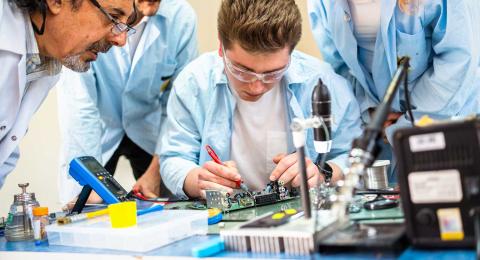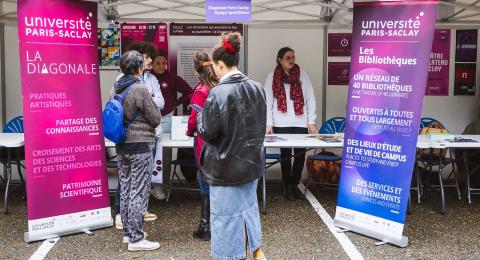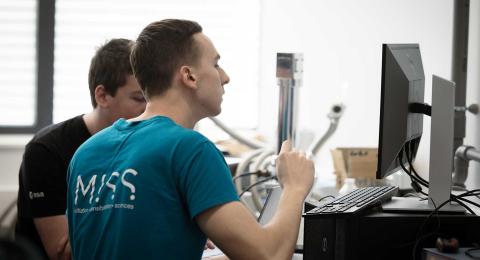The Master HuGeInBIO provides cutting-edge knowledge in cancer, disease modeling and biotherapies, with a focus on genomics and its impact on health and precision medicine. It also covers key areas, as genome editing and large-scale genetic screening for drug development, and fosters awareness of bioethics and entrepreneurship at the crossroads of science, innovation and business. The curriculum blends theory with practice through case studies and real-world scenarios with field professionals.
The training program is structured into four blocks. The Core block (12 ECTS) provides principal methods in functional genomics, overview in biotherapies and highly specialized methods to characterize heterogeneity of samples and basics in mathematics and computational sciences in biology. The Research block (12 ECTS) includes an interdisciplinary project with a M2 in Bioinformatics, focusing on digital tools for data processing and interpretation in biology. It also features practical training in NGS data analysis and a seminar unit on diverse research topics. The Optional block (6 ECTS) offers a choice between units on innovation and bioethics or other biology specialties. The Internship block (30 ECTS) is dedicated to a research placement in industry or academia.
Informations
Compétences
Students will learn to formulate hypotheses, design and carry out experimental projects, and generate validated scientific data. They will also develop the ability to monitor scientific advances and independently synthesize the state of the art on a given research topic.
Students will be trained to use new technological tools, communicate scientific data and concepts to both experts and non-specialists, justify methodological choices and interpretations, and critically analyze scientific information from articles or conferences in English.
Students will develop autonomy, teamwork, and time management skills to meet deadlines. They will also learn to collaborate with external partners—scientific or non-scientific, national or international—across various professional contexts.
Objectifs pédagogiques de la formation
This training will provide you with a strong foundation in modern genomics and its applications in research and healthcare. You will develop:
- Expertise in structural and functional genomics techniques, with a focus on single-cell analysis and the study of spatial and temporal cellular heterogeneity in complex biological samples—essential for choosing the right approach to specific scientific questions.
- Hands-on skills in implementing multi-omics strategies from an experimental point of view, enabling you to work confidently in a laboratory setting.
- A clear understanding of how genomic data impacts patient diagnosis, care, and treatment, including the use of large-scale screening tools (such as CRISPR/shRNA or compound libraries) for therapeutic discovery.
- The ability to collaborate effectively with bioinformaticians, guiding data processing workflows and independently performing downstream functional analysis to extract and apply relevant findings to your research projects.
- Awareness of the ethical and legal challenges surrounding precision genomics and the responsible use of genomic data.
- An introduction to entrepreneurship in human genomics, helping you explore the intersection between science, innovation, and business development.
- Insight into the broader research ecosystem, both nationally and internationally, through seminars and courses offered in collaboration with public and private partners—including those from the EUGLOH European University Alliance.
Throughout the program, students will benefit from a cutting-edge research environment in genomics and post-genomics. This Master’s program is developed in synergy with Genopole and the GenoTher biocluster, and in collaboration with the Paris Saclay Cancer Cluster.
Débouchés
Professionnels
Ingénieur d’études / de recherche dans un service R&D dans l’industrie ophtalmique
Ingenieur R&D
Responsable de projets R&D
Responsable de projets R et D
Chef de projet
Ingénieur d’études dans les domaines de l’industrie
Ingénieur d’études dans les domaines de la recherche
Ingénieur d'études industrie / recherche publique
Enseignants-chercheurs
Ingénieur.e d’études
Ingénieur.e recherche & développement
Chargé.e de recherche et innovation
Chargé·e de projet
Chef·fe de projet en biotechnologies, biothérapies ou innovation en santé
Ingénieur.e recherche et développement
Ingénieur de recherche ou d'études
enseignant.e-chercheur.se (après un doctorat)
ingénieur.e d'étude
Ingénieur de recherche
ingénieur de projet en santé
ingénieur d'études
Chargé·e de développement
Chargé·e d’études
Poursuite d’études
Doctorat
Doctorat en Chimie / Biologie
PhD
Thèse de doctorat
Tarifs et bourses
Les montants peuvent varier selon les formations et votre situation.
Voie d’accès
Capacité d’accueil
Places
Public visé et prérequis
Recruitment is open to students who hold a Master 1 degree in Molecular and Cellular Biology from Paris-Saclay University, particularly those who have completed the following courses: Biologie des Génomes, Biothérapies and Cellules Souches et Biologie des Cancers, or those enrolled in the Master 1 International Track in France – parcours Évry-Paris-Saclay, or the Master 1 International Track Sino-French Program.
Recruitment is also open to students holding a French degree equivalent to the first year of a Master's in Biology, with certified English language proficiency.
Additionally, students with a Bachelor's degree in Science in relevant fields such as molecular biology, biotechnology, genetics, genomics, or bioengineering are eligible to apply.
Période(s) de candidature
Du 30/01/2026 au 30/06/2026
Pièces justificatives
Obligatoires
Lettre de motivation.
Tous les relevés de notes des années/semestres validés depuis le BAC à la date de la candidature.
Attestation de niveau d'anglais.
Curriculum Vitae.
Facultatives
Dossier VAPP (obligatoire pour toutes les personnes demandant une validation des acquis pour accéder à la formation) https://www.universite-paris-saclay.fr/formation/formation-continue/validation-des-acquis-de-lexperience.










